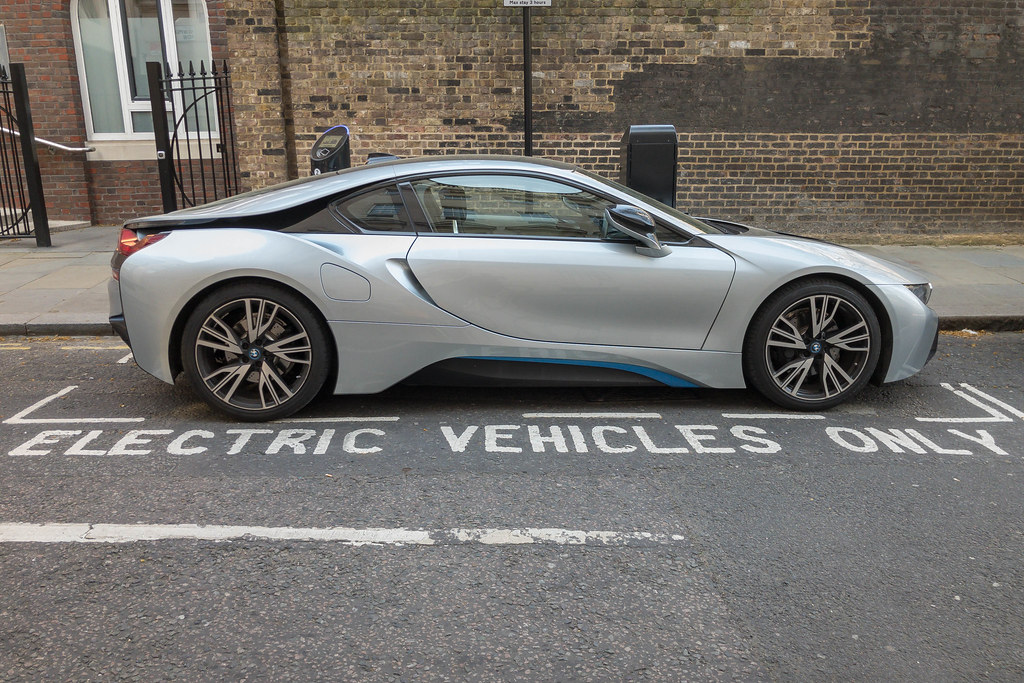
(marcoverch/Creative Commons)
Democrats head into 2022 having recently suffered several disappointing legislative failures. President Joe Biden’s proposed Build Back Better Act is on life support after Sen. Joe Manchin (D-W.Va.) rejected a proposed bill that would cost $5 trillion over a decade if all programs were extended.
As congressional Democrats attempt to salvage their legislative agenda ahead of the midterms, they will have to make tough choices on which programs stay in and which come out. One provision that must be prioritized is consumer subsidies for electric vehicles (EV), which would dramatically reduce U.S. greenhouse gas emissions and improve the feasibility of EVs in Atlanta.
Biden has set a goal to reduce U.S. greenhouse gas emissions by about half by 2030, using the emissions of 2005 as a benchmark. This ambitious target is in line with what climate scientists say is needed to prevent climate disaster. One of the most dangerous emissions sources pushing the U.S. toward disaster is vehicles. In 2019, the Environmental Protection Agency estimated that transportation made up almost 30% of economy-wide emissions.
EVs are clearly the cleaner alternative to combustion-powered cars. Energy grids across the U.S. are becoming cleaner and recycling initiatives for EV components are ramping up. Current estimates hold subsidies responsible for 30% of emissions saved by EV ownership. Studies show that subsidies have created a 29% increase in EV sales. With such a large impact, further subsidies are highly likely to dramatically increase EV ownership.
Build Back Better would provide incentives of up to $12,500 for people buying new EVs. That includes $4,000 for most vehicles plus additional incentives for those assembled domestically and by union workers, and those with more climate-friendly batteries. This would be especially helpful for low-income households who have been priced out of the clean energy transition because EVs are roughly $10,000 more than the industry average. When subsidized sufficiently, EVs provide a cost-effective alternative to gasoline-powered cars, saving a great deal of money on gas.
Atlanta ranks first in income inequality among cities in the U.S., and it is crucial that low-income residents are still able to buy environmentally-friendly vehicles.
Georgia, in particular, is in dire need of the subsidies. The state ended a major tax break for purchases of EVs in 2015 and has since implemented a fee of over $200 for these vehicles. The fee eliminates the gas savings incentive for owning an EV.
Subsidies would incentivize more purchases in the Atlanta area, which consistently ranks among the top five cities for EV infrastructure, but ranks l0w in incentives. Atlanta could easily become one of the best locations in the U.S. to own an EV. The city signed the 2021 COP26 declaration to accelerate the transition to 100% zero-emission cars and vans. Federal assistance would bring the city further in line with this commitment, providing a boost for similar pro-environment initiatives in both the city and beyond.
The consequences of today’s climate policy will echo for the rest of our lives. While passage of this provision in Build Back Better is in the hands of elected Democrats, the battle to save the climate will not stop there. If the U.S. is to do its part to stop climate change, every student needs to be conscientious about the climate and aware of the progress or lack thereof occurring at any given time. Emory students are perfectly poised to be educated in climate issues and begin a lifetime of climate advocacy ranging from grassroots activism to decision-making at the highest echelons of government.
If the U.S. is to meet Biden’s goal, we do not have time for the market to drive costs down. Despite market progress in adopting EV technology, the rate of increase is not fast enough to meet the deadlines set by the current administration. Considering the benefits for Atlanta, Congress must do whatever possible to get these electric vehicle provisions to the president’s desk. These measures need to be passed regardless of whether there is support for the rest of the bill. To sacrifice such a beneficial policy in the hopes of gaining bargaining power for other policy priorities would seriously set back efforts to combat climate change.
Daniel Matin (25C) is from Franklin, Tennessee. William Wainwright (25C) is from Atlanta, Georgia.
William Wainwright (he/him/his 25C) is from Atlanta, Georgia and is planning on majoring in international studies. He is interested in politics, philosophy and music. He will also read just about any book you put in front of him.





